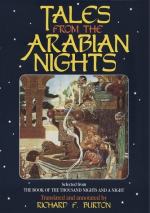“If a black wear red, e’en an ass would grin.”
[FN#186] Suggesting that she had been sleeping.
[FN#187] Arab. “Raushan,” a window projecting and latticed: the word is orig. Persian: so Raushana (splendour)=Roxana. It appears to me that this beautiful name gains beauty by being understood.
[FN#188] The word means any servant, but here becomes a proper name. “Wasifah” usually= a concubine.
[FN#189] i.e. eagerness, desire, love-longing.
[FN#190] Arab. “Rind,” which may mean willow (oriental), bay or aloes wood: Al-Asma’i denies that it ever signifies myrtle.
[FN#191] These lines occur in Night cxiv.: by way of variety I give (with permission) Mr. Payne’s version (iii. 59).
[FN#192] Referring to the proverb “Al-Khauf maksum"=fear (cowardice) is equally apportioned: i.e. If I fear you, you fear me.
[FN#193] The fingers of the right hand are struck upon the palm of the left.
[FN#194] There are intricate rules for “joining” the prayers; but this is hardly the place for a subject discussed in all religious treatises. (Pilgrimage iii. 239.)
[FN#195] The hands being stained with Henna and perhaps indigo in stripes are like the ring rows of chain armour. See Lane’s illustration (Mod. Egypt, chaps. i.).
[FN#196] She made rose-water of her cheeks for my drink and she bit with teeth like grains of hail those lips like the lotus-fruit, or jujube: Arab. “Unnab” or “Nabk,” the plum of the Sidr or Zizyphus lotus.
[FN#197] Meaning to let Patience run away like an untethered camel.
[FN#198] i.e. her fair face shining through the black hair. “Camphor” is a favourite with Arab poets: the Persians hate it because connected in their minds with death; being used for purifying the corpse. We read in Burckhardt (Prov. 464) “Singing without siller is like a corpse without Hanut”—this being a mixture of camphor and rose-water sprinkled over the face of the dead before shrouded. Similarly Persians avoid speaking of coffee, because they drink it at funerals and use tea at other times.
[FN#199] i.e. she is angry and bites her carnelion lips with pearly teeth.
[FN#200] Arab. “Wa ba’ad;” the formula which follows “Bismillah”—In the name of Allah. The French translate it or sus, etc. I have noticed the legend about its having been first used by the eloquent Koss, Bishop of Najran.
[FN#201] i.e. Her mind is so troubled she cannot answer for what she writes.
[FN#202] The Bul. Edit. (i. 329) and the Mac. Edit. (i. 780) give to Shams al-Nahar the greater part of Ali’s answer, as is shown by the Calc. Edit. (230 et seq.) and the Bresl. Edit. (ii. 366 et seq.) Lane mentions this (ii. 74) but in his usual perfunctory way gives no paginal references to the Calc. or Bresl.; so that those who would verify the text may have the displeasure of hunting for it.




